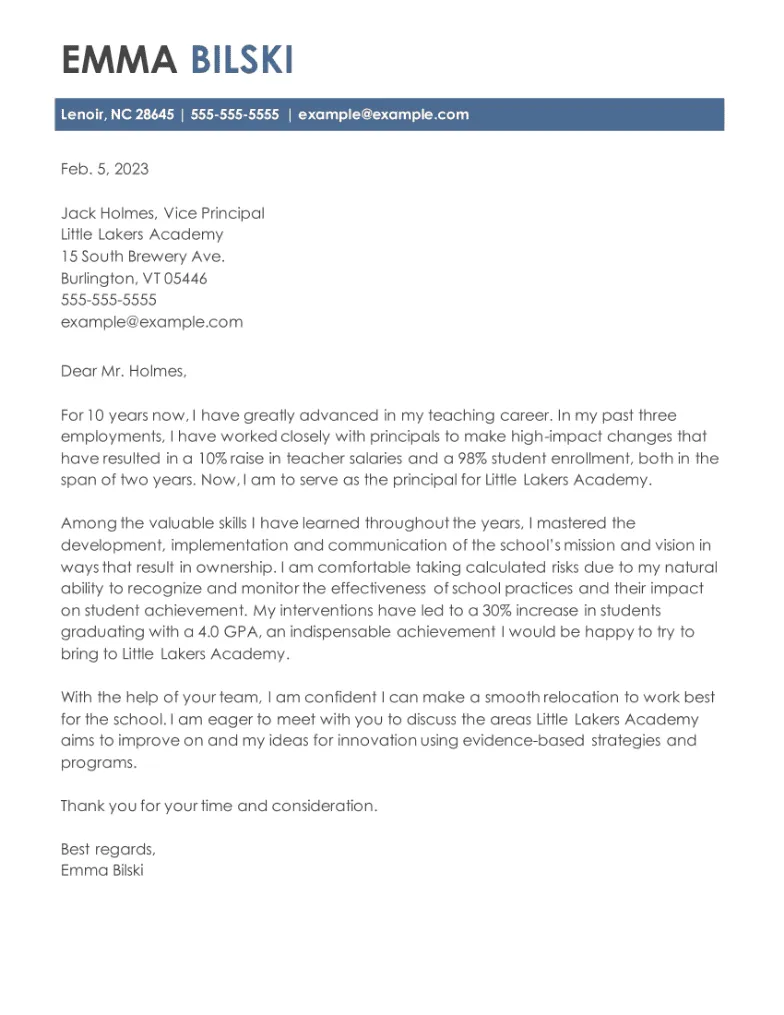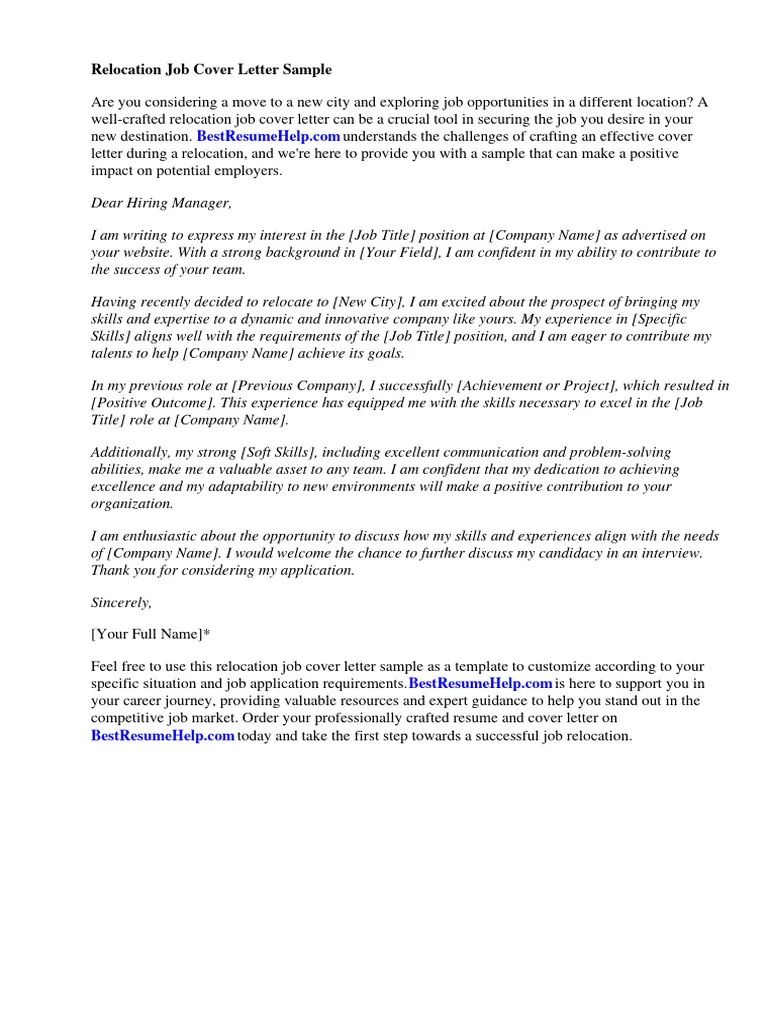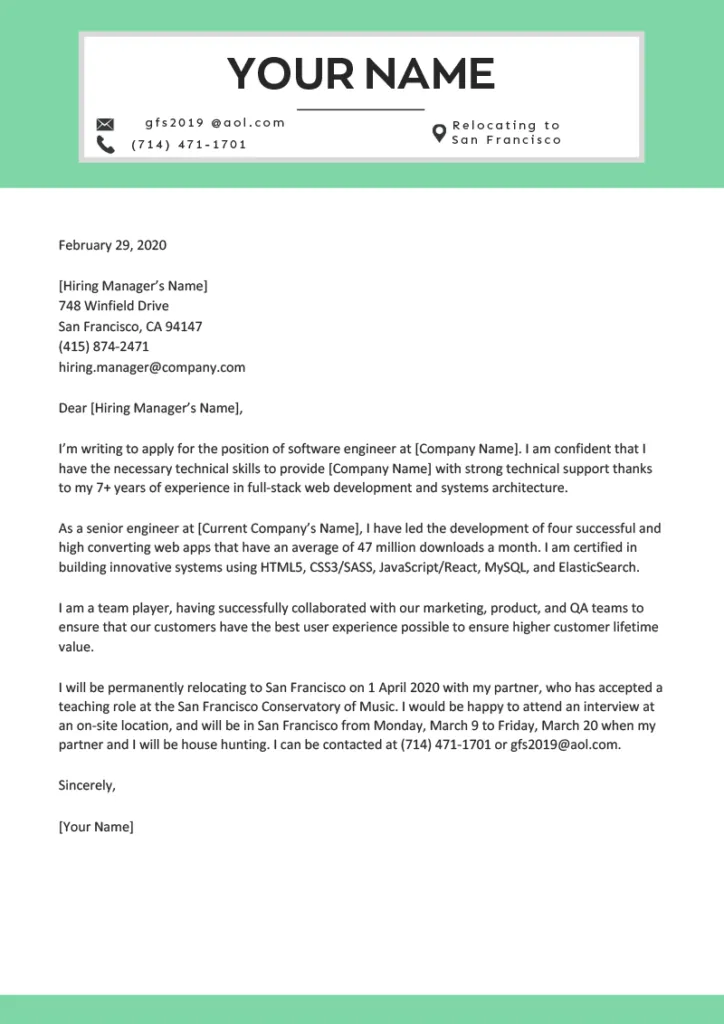Why You Need a Relocation Cover Letter
A relocation cover letter is essential when you’re applying for jobs that require you to move. It’s your opportunity to introduce yourself to a potential employer while addressing the specific challenge of relocating. Unlike a standard cover letter, this one must explicitly and persuasively communicate your willingness and ability to move to a new location. Many hiring managers might automatically dismiss your application if they’re unsure about your relocation plans. This letter allows you to clarify any uncertainties and demonstrate your commitment to the role and the company. A well-crafted cover letter can also set you apart from other candidates, showing your initiative and attention to detail, both crucial qualities in any job. Every advantage is significant, especially when you’re relocating, and your cover letter is one of the most important.
Highlighting Your Transferable Skills
When applying for a job in a new location, focus on your transferable skills. These are the skills you’ve gained from previous roles that are relevant and valuable in the new position, regardless of the specific industry or job. Examples include communication, problem-solving, teamwork, and leadership. Clearly identify these skills and explain how they benefit the company in your cover letter. Back up your claims with concrete examples of how you’ve used these skills to achieve positive results. Quantify your achievements whenever possible; instead of saying you improved customer service, specify that you “increased customer satisfaction scores by 15%.” This adds credibility and shows the impact you can make.
Demonstrating Your Enthusiasm

Showcase your enthusiasm for the role and the relocation opportunity. Your cover letter is an excellent place to show your genuine interest in the company and the position. Highlight specific aspects of the job or company that excite you and explain why you’re interested in working there. This could be their mission, their values, their recent projects, or the potential for professional growth. Tailor your letter to the company and the specific role. Researching the company and mentioning particular details shows you’ve done your homework and are genuinely interested in the opportunity. This enthusiasm sets you apart and reassures the hiring manager that you’re motivated to succeed in the role and committed to the relocation process.
Addressing the Relocation
How you address the move is one of the most important parts of your relocation cover letter. Be direct and reassuring. Clearly state your intention to relocate, including your timeline. If you already have plans, like a move date or accommodation, include this to ease the employer’s concerns. If you are flexible, state that as well. Make the relocation process as easy as possible for the employer. For example, state your willingness to attend interviews in person (if possible) and your readiness to start as soon as the role requires. Avoid ambiguous or vague language that might make the hiring manager question your commitment. Show the employer you are prepared to relocate and be ready to work. This transparency will greatly boost your chances of success.
Mentioning Your Reasons
Briefly mentioning your reasons for relocating can add context and credibility. You don’t need to overshare personal details, but a concise explanation can help the hiring manager understand your situation. This could be as simple as looking for new opportunities in a specific area, being drawn to the company, or having personal reasons for moving. Focus on the positive aspects of the move, like career advancement or experiencing a new lifestyle. Avoid negative reasons, such as dissatisfaction with a previous job. Frame your reasons in a way that connects with the company’s values or the role’s opportunities. This shows you’ve put thought into your decision and increases the likelihood of the employer seeing you as a good fit.
Researching the Company Culture

Before writing your cover letter, thoroughly research the company’s culture. This will enable you to tailor your letter to match their expectations and values, demonstrating that you understand their business. Visit their website, read the “About Us” section, and check their social media. Look for information about their mission, values, and work environment. If possible, read reviews from current or former employees. Use this information to highlight how your skills and experience align with their values. For example, if the company emphasizes teamwork, mention your experience working collaboratively on projects. If they value innovation, talk about how you have brought creative solutions to previous roles. Demonstrating that you are a good fit for the company culture makes you a more attractive candidate.
Emphasizing Your Value Proposition
Clearly communicate your value proposition in your cover letter—what you can bring to the company. Highlight the specific skills, experiences, and achievements that make you a strong candidate. Directly link your qualifications to the job requirements listed in the job description. Rather than just listing your skills, show how you’ve used them to achieve results. Provide specific examples of past successes, quantifying your achievements wherever possible. Focus on what you can contribute to the company, not just what you’ve done in the past. Instead of stating you are a “skilled project manager”, say you “managed projects on time and under budget, leading to a 10% increase in efficiency.” Highlighting your value proposition makes it easy for the hiring manager to understand how you will contribute to the company’s success.
Tailoring to the Job Description
Each cover letter should be customized to match the specific job description. Avoid using a generic cover letter for multiple applications. Carefully review the job requirements and identify the key skills and experiences the employer seeks. Customize your letter to emphasize the qualifications that align with those needs. Where possible, use the same keywords and phrases from the job description, but don’t simply copy and paste. Naturally integrate these keywords into your writing. Show how your skills and experience match the company’s needs. Personalize your letter by mentioning the company name and the specific role. If you can, research the hiring manager and address them directly; this adds a personal touch. This shows you’re seriously interested in the position and have taken the time to understand the requirements.
Relocation Cover Letter Examples

Reviewing relocation cover letter examples is a great way to understand how to structure and format your own. Search online for examples tailored to your industry or the type of job you are applying for. Pay attention to how the candidates address their relocation plans, highlight their skills, and express their enthusiasm for the role. Note the language, tone, and level of detail. While you shouldn’t copy these examples, they can inspire your own letter and help you understand which elements to include. Look for examples that are concise, well-organized, and clearly communicate the applicant’s value proposition. Make sure the examples you use come from trustworthy sources and relate to your job search. Modifying and personalizing these examples can significantly boost the effectiveness of your cover letter and increase your chances of securing an interview.
Template for your letter
A well-structured template can simplify the process of writing your relocation cover letter. The format is similar to a standard cover letter, but with key additions to address the relocation. Start with your contact information, the date, and the hiring manager’s information. Write a concise introduction that states the position you’re applying for and why you’re interested. Discuss your relevant skills and experiences in the body, connecting them to the job requirements. Include a separate paragraph or section addressing your relocation plans, including your timeline and willingness to move. End with your enthusiasm and thank the hiring manager. Proofread carefully to avoid errors. A clear, personalized, and well-organized cover letter will leave a strong impression and increase your chances of getting the job.
